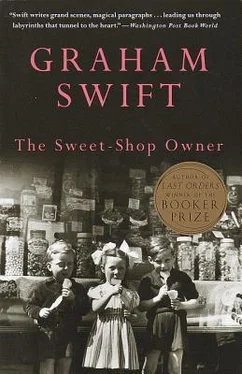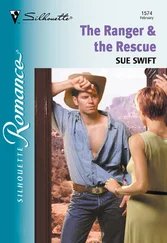Graham Swift - The Sweet-Shop Owner
Здесь есть возможность читать онлайн «Graham Swift - The Sweet-Shop Owner» весь текст электронной книги совершенно бесплатно (целиком полную версию без сокращений). В некоторых случаях можно слушать аудио, скачать через торрент в формате fb2 и присутствует краткое содержание. Год выпуска: 2012, Издательство: Vintage Books USA, Жанр: Современная проза, на английском языке. Описание произведения, (предисловие) а так же отзывы посетителей доступны на портале библиотеки ЛибКат.
- Название:The Sweet-Shop Owner
- Автор:
- Издательство:Vintage Books USA
- Жанр:
- Год:2012
- ISBN:нет данных
- Рейтинг книги:4 / 5. Голосов: 1
-
Избранное:Добавить в избранное
- Отзывы:
-
Ваша оценка:
- 80
- 1
- 2
- 3
- 4
- 5
The Sweet-Shop Owner: краткое содержание, описание и аннотация
Предлагаем к чтению аннотацию, описание, краткое содержание или предисловие (зависит от того, что написал сам автор книги «The Sweet-Shop Owner»). Если вы не нашли необходимую информацию о книге — напишите в комментариях, мы постараемся отыскать её.
The Sweet-Shop Owner — читать онлайн бесплатно полную книгу (весь текст) целиком
Ниже представлен текст книги, разбитый по страницам. Система сохранения места последней прочитанной страницы, позволяет с удобством читать онлайн бесплатно книгу «The Sweet-Shop Owner», без необходимости каждый раз заново искать на чём Вы остановились. Поставьте закладку, и сможете в любой момент перейти на страницу, на которой закончили чтение.
Интервал:
Закладка:
30
‘Something up with the car?’
He gripped the briefcase more tightly, as if Hancock, stepping over onto his side, might have been about to snatch it.
‘No. No. I thought I’d walk. For a change.’
‘Sure you’re up to it old man?’
Hancock’s breath smelt of drink. The face was bleary-eyed, brick red. Five years ago the voice might have held a taunt (you — with your limp and weak chest — walk to Pond Street!), but now it seemed almost to waver with sympathy.
‘Pay-day at Pond Street?’
‘Yes.’
They stared inertly at each other as if looking into mirrors. Save for Hancock’s visits to the shop, they scarcely met, and now that they came face to face in the street it was as if something needed explaining.
‘I — er — was going to pop in on my way back.’
‘That’s all right. Mrs Cooper’s there.’
‘Of course. Look — are you sure you should be walking over there?’
‘Sure enough.’
Hancock shuffled awkwardly.
‘Well — mind how you go.’ He held out a hand indecisively. It was as if he were about to offer support — or needed to be steadied himself. But he changed the gesture in mid-course and pointed to the briefcase.
‘Hang on to the goods,’ he said drily.
Down Allandale Road. Past Armstrong’s garage. Armstrong’s pump attendants, who no longer were issued with blue and yellow overalls, lounging in the heat in faded singlets and jeans. Up above, the garish blue canopy with the company insignia and a sign saying ‘Quadruple Stamps’ — as if to make up for the hard prices on the petrol pumps. Those Arabs had driven a tough bargain. But on the forecourt there were great glistening black patches. See, it still gets spilt, precious stuff.
Across Allandale Road. Shade on this side. Breathing hard already. Pain in the chest just nudging. He would have to gauge it carefully; rest now and then.
A few shops to left and right. An electrician’s, an Asian food shop, a betting shop; and then the rows of tall, bay-fronted Victorian houses, with basements and steps up to the door, converted into offices and dental surgeries, or knocked down to make way for new blocks. Builders’ merchant’s; a car showroom; the squat, oblong office of a firm that made light bulbs. Dairy on the left opposite Finch Street (horses once, snorting and clopping; troughs outside, yellowish at the rim). Baptist church, zebra crossing, then more shops. Follow the road where it descends and curves to the left, and you get to where Mrs Cooper lives.
He turned right, out of the shade, into Finch Street, carrying the pain in his chest as if it were something he could retain or release at will. Finch Street was a cul-de-sac. Like the other streets to the right off Allandale Road it ended in railings and the footpath which skirted the common.
I told her, Dorry. That winter she came out of hospital and we bought Pond Street. She would have found out anyway. She had a way of knowing things, of sensing them before I even guessed them, so that what she didn’t know you felt compelled to tell her. ‘I think Dorry’s got a boy-friend,’ I said. ‘At last,’ I added, as though to pass it lightly off. She was sitting in her chair where she always sat now, that Angora shawl round her shoulders, pink with a grey-blue weave in it. She didn’t answer at first, as if she were waiting to hear something else.
‘Who?’ she said quietly.
But I didn’t know who. I didn’t say it was only a father’s guess. I knew nothing precise. You came home that Christmas and you said nothing, but you knew she knew, and you looked at me accusingly. She studied you, as if you might be marked, changed. You found it hard to meet her eyes.
And as though to overcome all that, you said blandly and indifferently one weekend in February: ‘Oh, I’ve met a man at college. A history graduate. We’ve been going out some time.’ As if you were afraid to make your voice sound glad.
‘Oh, that’s nice. Isn’t that nice, Willy? We must meet him sometime.’
You looked at her as if she were mocking you, calling the bluff of your own casualness. As if you’d expected anger, alarm.
‘You must bring him down here, Dorry.’
‘Maybe.’ You shrugged. ‘All right.’
And so you brought him, a fortnight later. To outface her challenge and to call her bluff in return? Or do I mis-judge you, Dorry? Did you come simply to oblige an ailing mother and a fond father?
Were you still, then, the good, the loyal daughter?
31
The tea things were laid on the trolley and on the mahogany cake stand. Salmon and egg and cress sandwiches, which she wasn’t allowed to eat; a cake, a Dundee. Mrs Pritchard had come specially to clean and help in the kitchen and I’d asked Mrs Cooper (‘That’s all right,’ she said, ‘I’ll manage’) to stand in at the shop. We hadn’t had a visitor in that house for so long. She put on a cream silk blouse, unworn for years. The sleeves seemed filled only with air. But she covered them with her shawl and sat in her chair, waiting. We heard the car pull up outside. I watched from the window. A blue Mini.
You had a bunch of flowers in your hand which you gave to him as he finished locking the car door. You whispered something as you came up the path. He buttoned his jacket. You straightened your dress. A performance.
‘This is Michael. Michael, Mother and Father.’
He was tall, keen-eyed; a large, strong hand held out for mine. His robust, intelligent good looks made me think of Doctor Cunningham, so that I shrank a little, as I did under those cool questions at the hospital, having expected someone somehow less imposing. He spoke deftly and fluently, crossing his long legs on the sofa and clasping his knee, and I felt my own voice falter when I offered: ‘History. Now I’ve always been fascinated by history.’ And I felt forlorn as you looked at me reproachfully, then turned your head in embarrassment at the conversation that failed to follow. In the silences, he gazed round, curiously, at the porcelain in the cabinet and the vases on the mantelpiece. His eyes would fix on Irene, then look quickly away. And I noticed, more than once, he gave the same look to you.
Your face reddened. With shame, with anger? I watched the colour deepen, the more the cups chinked, the more she wheezed in her armchair, plucked at her shawl and now and then coughed into her serviette, patting her throat and saying, ‘Oh I’m very sorry, please do forgive me, please’ — and I watched it flare up as if some draught had fanned it when she brushed crumbs from her blouse and announced:
‘Well Michael, it’s so nice to see you. You know, Dorothy doesn’t tell us much about you. She keeps her secrets. So you’re working for a doctorate. We must think of your futures, mustn’t we?’ She lifted her cup. ‘What exactly are your arrangements?’
I didn’t know she would have said that. Believe me, I had nothing to do with those words; and even I sat, with my slice of Dundee cake poised, in surprise, before my lips. Should I have intervened, put down my plate, and said, like a discreet husband, ‘Now really dear,’ and laughed? Made it clear it was only a game of bluff? But I wasn’t clear if it was only a game. Games turn into fights.
‘Well, when you say arrangements, Mrs Chapman’ — confusion and hostility suddenly upset the deftness — ‘I’m not sure that I — we — that’s to say it doesn’t — it’s a question of — what exactly do you mean by “arrangements”?’
And I watched Irene, in her chair, almost imperceptibly, draw in her feet.
Later, as you washed up the things together, dutifully, in the kitchen, I overheard snatches of your talk: ‘That was fun, wasn’t it?… I told you, didn’t I?… He doesn’t say much, does he?… Oh you were lucky he took time off from his precious shop to see us — he’ll be straight off again after this … this bloody china … so we know what to do now, don’t we Mike? Don’t we?…’
Читать дальшеИнтервал:
Закладка:
Похожие книги на «The Sweet-Shop Owner»
Представляем Вашему вниманию похожие книги на «The Sweet-Shop Owner» списком для выбора. Мы отобрали схожую по названию и смыслу литературу в надежде предоставить читателям больше вариантов отыскать новые, интересные, ещё непрочитанные произведения.
Обсуждение, отзывы о книге «The Sweet-Shop Owner» и просто собственные мнения читателей. Оставьте ваши комментарии, напишите, что Вы думаете о произведении, его смысле или главных героях. Укажите что конкретно понравилось, а что нет, и почему Вы так считаете.












